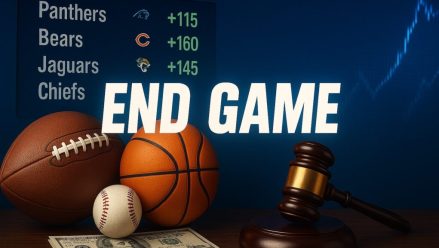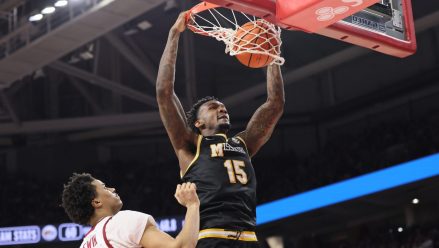Lobbyist Brianne Doura-Schawohl put a fine point on the state of responsible gaming Monday night in Las Vegas.
“We need to stop talking about it, and see more action,” she told a group of gambling professionals at Underdog’s GuardDog “From Vision to Application: The Evolution and Future of RG Technology” panel. GuardDog is Underdog’s responsible gaming innovation fund, now in its third year.
Eight years removed from the U.S. Supreme Court making sports betting a state’s rights issue, and in a fast evolving gambling landscape, the panel also brought together former Colorado regulator Dan Hartman, idPair founder Jonathan Aiwazian (the first GuardDog winner), and Birches Health founder Elliott Rapaport. The moderator was Underdog’s Responsible Gaming Vice President Adam Warrington.
The panel agreed that responsible gaming is not the sexiest of gambling topics, but it has risen to be one of the most talked about, and one that needs some immediate attention. Unregulated platforms and prediction markets, all of which have fewer guardrails than state-regulated gambling entities, continue to move into the gambling landscape. Underdog founder Jeremy Levine said that his company — which now offers limited prediction markets in 16 states as a tech partner to Crypto.com — is committed to bringing the “same level of care concern” it offers to RG with its sports betting and daily fantasy products to its new prediction market offering.
Prediction markets are federally regulated, and legal gambling stakeholders argue that the lack of required consumer protections around the products leaves players at high risk for gambling addiction.
Why sharing info is necessary
Monday’s panel didn’t address specific gambling or sports betting products, rather it focused on the future of RG. Aiwazian, whose company developed technology to share self-exclusion lists and track player data across platforms, said current responsible gambling tools are effective when consumers play on a single app. But once a bettor uses multiple accounts — and Aiwazian said 76% of bettors use multiple apps — the tools become ineffective.
“So each operator will look at each person, and they might look fine at just one [platform],” he said. But every betting scandal informs the next one, “so don’t bet $80,000 on one app; bet $2,000 on 40 apps, and no one will notice,” Aiwazian said.
idPair creates a central database, similar to what is already in place in some European countries, where bettors get a single ID that is then shared across platforms. That would mean that deposit limits, bet limits, time limits, and the like are available to any platform that a bettor logs onto.
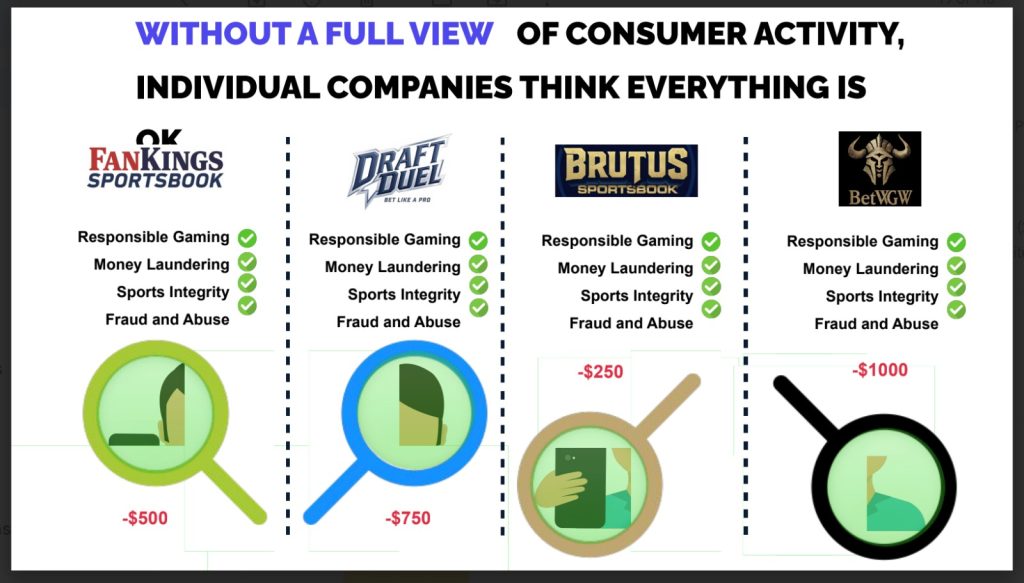
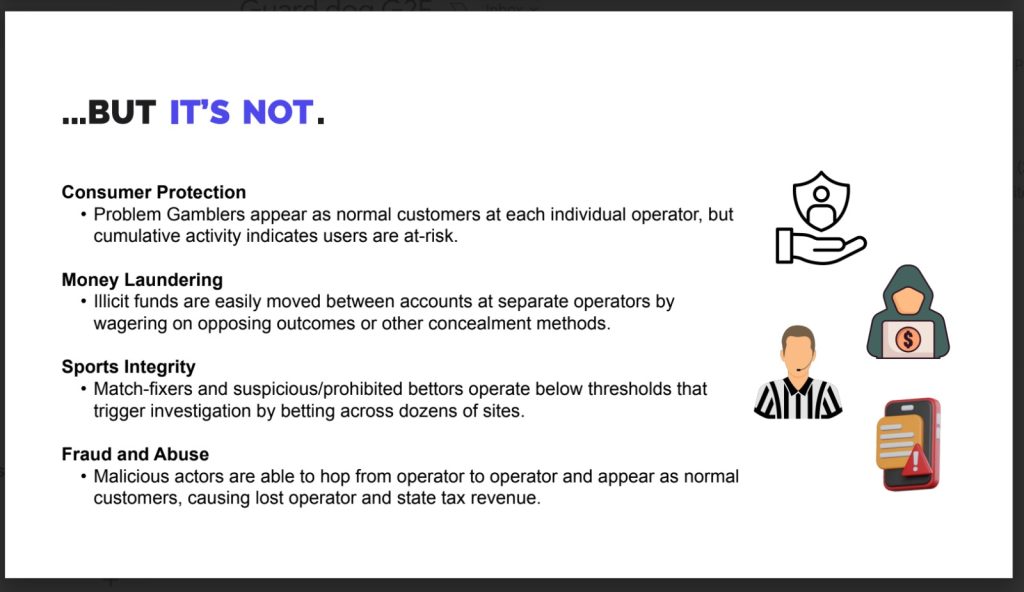
“With that, when a player hits the $2,500 New Jersey limit [across platforms], then intervention would be warranted,” he said. Without the shared information, a bettor could set a $2,500 limit on, for example, DraftKings, reach it, and then set the same limit on FanDuel, ultimately surpassing the $2,500 limit. New Jersey has a $2,500 lifetime deposit threshold in place. Operators are required to flag consumers when they hit that, as a checkpoint of sorts. It is not a hard cap.
idPair has been several years in the making, and was seeded in part with $1 million from GuardDog in 2023. IDPair also won the 2023 Flutter Entertainment and Responsible Gaming Council Play Well Challenge and 2024 VIXIO Regulatory Initiative of the Year for the National Voluntary Self-Exclusion Program.
Shared self-exclusion program elusive
A shared self-exclusion program — and new technologies to aid in the identification and prevention of problem gambling — has long been on the wishlist for responsible gambling advocates. idPair is creating such lists for fantasy groups, Indian Country, and others. In addition, the Responsible Online Gambling Association (ROGA) earlier this month announced that it selected Lexis-Nexis to craft and operate its multi-operator self-exclusion list.
The development of such lists is clear progress, though it does not seem that a universal, national list is in the works. Rather, ROGA’s list will be available to the organization’s eight member operators. idPair is developing a national tribal gambling self-exclusion list, but so far, state regulators are not in on the sharing of information.
Hartman, now a consultant at GMA, said the regulatory “process may be a little slower.” Government agencies are not as nimble as startups or private-sector companies, but, he said, they do need to be in the loop about what’s coming in order to start the process of allowing such technologies.
He said that regulators must start removing “impediments to use the technologies” for operators.
What is ‘responsible gaming’?
Doura-Schawohl also suggested that the industry begin the process of untangling problem gambling and responsible gaming. Problem gambling refers to consumers who are in crisis or actively dealing with gambling addiction. Responsible gaming is the host of initiatives out there designed to educate gamblers, prevent an addiction from blossoming, and put tools to manage gambling in front of consumers.
Aiwazian took the idea a step further, saying that the industry must also “all agree on what problem gambling is. … Having a universal definition and having it public would be a great non-tech innovation.”
In addition to that universal definition, gambling stakeholders must also find ways to more seamlessly integrate responsible gaming into the online gambling experience. The panelists all pointed to the “siloed” nature of responsible gambling tools — they are often found via a pull-down tab or on their own page of an app, rather than being incorporated into a home page or somehow viewable alongside odds.
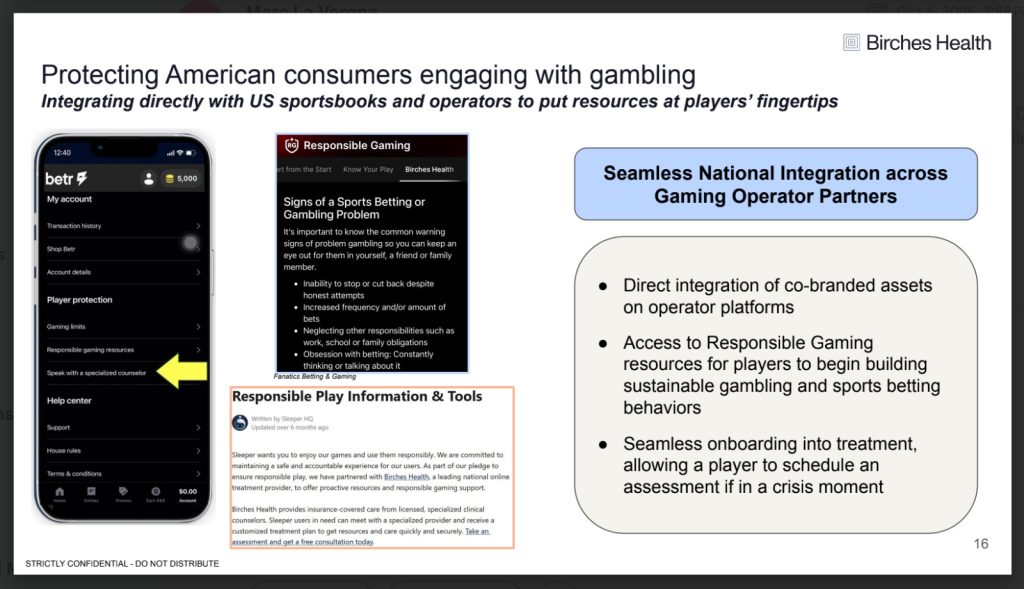
As Aiwazian pointed out, many players think the tools don’t apply to them or that needing the tools would indicate a problem. Rather, the panelists said, RG must become a more holistic part of the experience, preferably in such a way that bettors aren’t really even aware that they are using the tools.
“The conversation around responsible gaming has gone from reactive to proactive,” Rapaport said. He said that “the term ‘responsible gaming’ doesn’t resonate with everyone … they can find it unexciting or punitive.”
In a responsible gaming webinar hosted by the American Gaming Association in September, OpenBet Vice President of Regulatory Affairs & Compliance Jess Feil said her company was experimenting with surveying players about their RG habits using in-app messages. She said bettors are asked to participate in short polls to see how their habits compare to other gamblers like them — and that “people don’t like to be outliers,” so response has been strong. By reframing the questions and how they are asked, OpenBet is finding ways to engage players in RG in a different way.
While the industry — whether that is operators or innovators — continues to offer and experiment with new ideas, another “non-tech innovation” suggested by Doura-Schawohl is more collaboration across all sectors of responsible gambling.
In biggest picture, responsible gaming — maybe with a new, catchier name like “safe play” or “better bettor” — the panelists said, needs a makeover.
“It should be in subtle ways so that the consumer doesn’t even know it’s happening,” Doura-Schawohl said. “For me, it’s not about this ‘aha moment.’ Good RG is going to move the player into as seamless — or what do you say in the business, frictionless UX? — as possible.”





